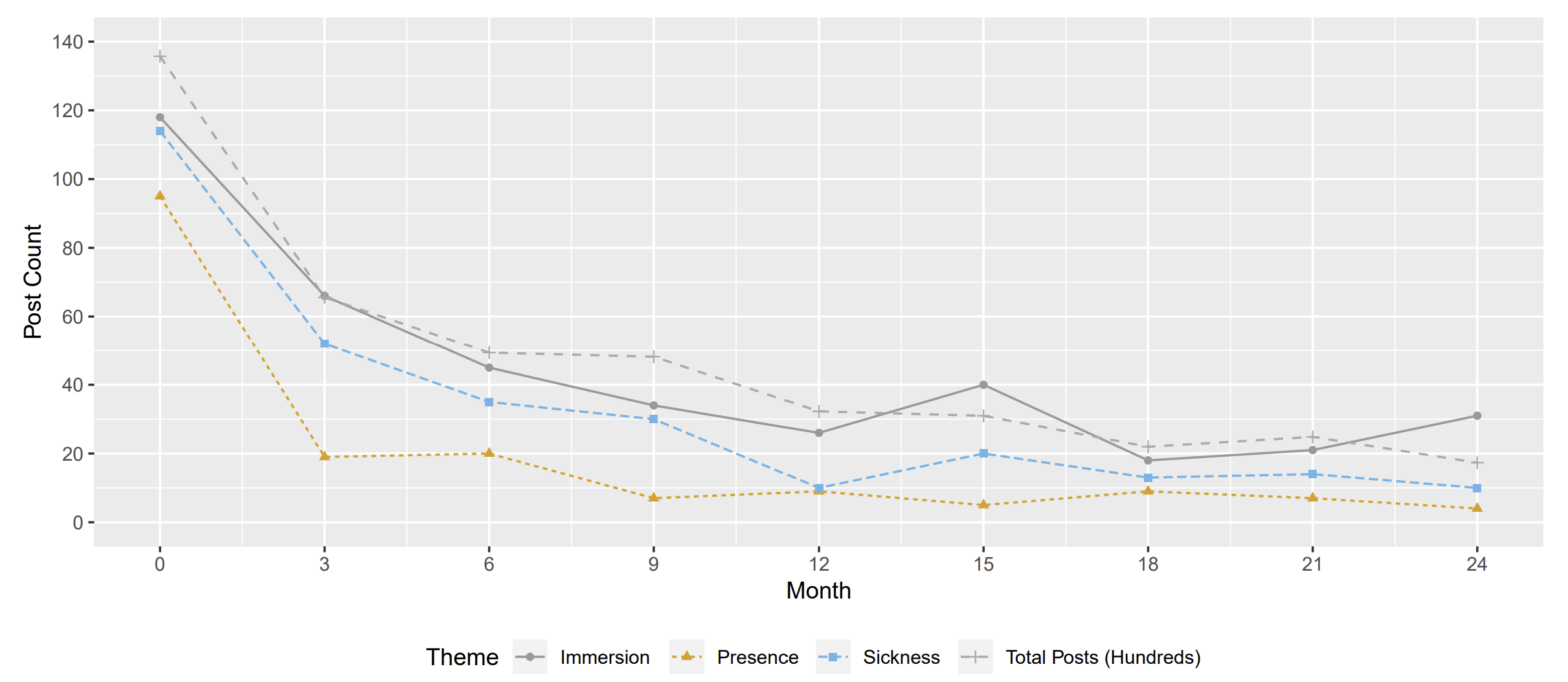Changes in Consumer Discussions Over Time
Consumers have created rich datasets documenting their experiences and preferences about VR through discussions about the technology in online forums. While much of this discussion focuses on specific games and is not necessarily relevant to general VR research, other aspects of their discussions can shed light on concepts in a way that would be difficult to examine in a laboratory. In the second phase of this project, we examined posts from the /r/Vive subreddit that were made in the first two years following the release of the HTC Vive (the first widely available consumer HMD). During this time period, 121,550 posts and 2,183,924 comments were made to this subreddit.
Our qualitative analysis of this data was initially guided by themes we identified through regular observation of the the forum. This led to the selection of three focus areas for this research: presence, VR sickness, and lingering effects. Data was collected using www.redditsearch.io, which provides access to Reddit data through the Reddit API. Search terms for each theme were identified iteratively based on our initial observations and early data collected via Reddit’s API.
As the primary focus of /r/Vive was on discussions of games and hardware, posts about presence and VR sickness did not make up a large portion of what was discussed on the subreddit. However, the relative number of posts referencing presence and VR sickness remained stable relative to the total numbers of posts per month (as shown in the below Figure), suggesting sustained interest in both of these topics.

Presence
Posts discussing presence were identified using a key-word search. Three themes relating to presence and immersion emerged from this search:
-
Immersion amplification
-
Immersion impediments
-
Locomotion’s effect on immersion
VR Sickness
Posts discussing VR sickness were identified using a key-word search. Three themes relating to VR sickness emerged from this search:
-
Discussing general advice on how to reduce or avoid VR sickness
-
Discussing the perceived causes of VR sickness
-
Discussing why VR sickness occurs
Lingering Effects
Posts referencing lingering effects were rarer than posts focused on presence or VR sickness, and employed a wider range of terms…
We identified three categories of lingering effects (e.g. experiences that occur in the real world after leaving VR): perceptual aftereffects, behavioral aftereffects, and increased vividness in dreams.
Perceptual Aftereffects
Perceptual aftereffects related to changes in how users perceived of their own bodies and the world around them. These effects were generally, though not exclusively, visual in nature.
-
Disrupted body ownership and proprioception:
-
Loss of a sense of depth in the real world
-
Persistent virtual elements continue to persist in the real world
-
Miscillaneous “visual glitches”
Behavioral Aftereffects
Behavioral aftereffects related to changes in how users behaved, or attempted to act, in the real world.
-
Verified the physicality of the real world through interaction
-
Hesitated when moving in the real world and when attempting to support oneself using a physical object
-
Attempts to use virtual interaction metaphors (e.g. teleportation) in real life
Increased Vividness in Dreams
Users frequently discussed changes to their dreams after using VR. While this did not affect users' experiences in the real world, it nevertheless attracted our attention due to its lingering nature. Participants discussed a range of changes, including the content of their dreams, the use of VR interaction metaphors in their dreams, increases to the vividness of their dreams, and more frequent lucid dreaming.
Duration of Aftereffects
Comments that included a temporal component were identified so as to better understand how these effects changed over time. When users discussed time, the general consensus was that:
1) Lingering effects only occurred after someone spent a long time in VR (over an hour)
2) They generally, though not always, began almost immediately after exiting VR
3) The time lingering effects lasted could vary greatly, ranging from a few seconds to over 12 hours
4) Lingering effects, with the occasional exceptions of vivid dreams, completely disappeared after several weeks of using VR
Publications from this phase of the project
-
[John Porter III, Andrew Robb (2019). An analysis of longitudinal trends in consumer thoughts on presence and simulator sickness in VR games. Proceedings of the Annual Symposium on Computer-Human Interaction in Play.](/publication/porter-2019-analysis/)
-
[[Pre-print] John Porter III, Andrew Robb. Lingering Effects Associated with Consumer Use of Virtual Reality.](/publication/porter-2020-lingering/)